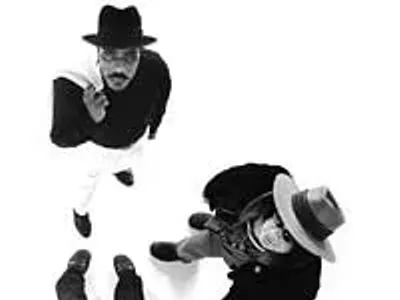One of America’s great heritages is the open road. The freedom that highways and railways represent — the promise of something or someplace else better — can be traced throughout the our ephemeral culture, from Kerouac’s dreams of a railroad earth to “Born To Run” to the continuing adventures of the Starship Enterprise.
And the list of masterful road storytellers in song — from Guthrie to Dylan to Townes Van Zandt — is not long. But it should include this guy Todd Snider. Snider’s a road-weary troubadour playing a mix of rock, country and folk-spun tunes with a writer’s eagle-eyed sense of detail and empathy for those people and places around him.
Snider’s new album — his seventh — East Nashville Skyline, is crammed with beauty, ugliness and humor, a sense of adventurous spirit and in-the-moment takes on lives in the margins. With casual, around-the-campfire aplomb, Snider sing-talks literate tales involving low-rent yet bigger-than-life characters, the kind that inhabit our periphery but are often overlooked.
See, Snider’s been working smoky barrooms from one side of this country to the other for more than a decade, since debuting in 1994 with the album, Songs for the Daily Planet, and the minor hit, “Talkin’ Seattle Grunge Rock Blues.”
For Snider, music was the option that best fit his nomadic heart and diminished circumstances.
“That’s something that got into my system before I was even a singer. My dad was a construction worker and I was around gypsies a lot,” Snider says from a hotel room in Dayton. “I saw music as an honest way to sort of live up to that ideal of — it’s almost like a nonmaterialism, but it’s got a sense of humor to it. I was young and we didn’t have any money and I just thought, when I decided to be a musician — I didn’t even play music — this is very much what I thought those people taught me, because if there are no doors open to you whatsoever, every door is open to you. Every door is as open to you as the next one.
“Your poverty is your freedom,” he continues. “And it felt like if I put my freedom as my No. 1 priority ahead of my finances, my freedom would always be financed. Sometimes I look back and think, ‘Good thing we were poor,’ because I got to choose whatever it was that I wanted to do. Because where I was from, my neighbors and friends were like, ‘I wonder what he’ll fail at,’ and I’m, ‘Shit, I can fail at anything.’”
Snider — whose only other job was a six-month stint as a busboy — takes stock in the different towns and people he meets, which offer grist for his ambling, country-inflected rock ’n’ roll songs.
“A lot of what I like about songs is chasing them around and living them out and seeing where they’re going to go,” Snider says. “Some person that approaches you and says, ‘Want to come with us?’ You think to yourself, there is no reason whatsoever that I should go with these people, but I’m going to, because — who knows? And I have many, many times tripped over songs because I was allowing myself to go out on this absurd side of the world, that the people on Cops get to go. Like the show gets over, some guy with a beard and a nickname says, ‘Come on, man, we’re going to Stacey’s,’ and you go, ‘Fuck it, there might be a big song over there for me.’”
Of course, this lifestyle has certain costs and crutches, which Snider freely indulged in for a time, prompting several trips to rehab, the most recent last year. Coming back home from tour, Snider passed out, only to wake up in rehab with a bad ulcer and an Oxycontin addiction. He acknowledges the problem on his new album with a cover of Fred Eaglesmith’s “Alcohol and Pills,” which notes how musicians from Hank Williams to Elvis Presley and Janis Joplin ended up on alcohol and pills, when, as he sings, “You’d think they would have been happy with the glory and the fame.” When Snider sings those lines he gives them a life all his own, removes them from whatever hackneyed context.
“It seems like a lot of singers end up with those problems, but on the other hand, plumbers don’t put out a record every couple years, and announce to the world what they’ve been going through, so I always wonder what the ratio is,” he says. “Then again, for a ton of the people in this line of work — particularly the road people — it’s like every night is a Friday night. And every day is a Sunday, and it’s easy if you’re prone to that sort of thing [booze, drugs] to get hooked up in it.
“It rolls up on you pretty fast. One day you wake up and you go, ‘Wow.’ You start out thinking it’s some kind of joke, and that people are just fucking with you. And then you’re in an ambulance,” Snider says, laughing. “It’s been over a year since I was in the middle of that, but it really seems like you can’t see how self-destructive it is. You just don’t even realize until you’re on the other side of it that that’s why everything seemed like it was so hard to do.”
Talk turns to Elliott Smith — a former Portland, Ore., resident, like Snider — and how hard it can be to appreciate one’s own fortunes when you’re going through that crucible, your perceptions corrupted by drugs and a fucked-up attitude.
“There’s a certain time in your life where you realize there’s not going to be something. My first album — it broke my illusions. I really thought it’d come out and I’d be happy. And, boy, that just didn’t happen at all. It doesn’t happen to anybody,” Snider says. “[Jimmy] Buffett was around me at the time, he just said, ‘Look, this isn’t going to change anything. If you don’t like yourself now, you’re not going to like yourself when this record comes out. You don’t like yourself now, you aren’t going to like yourself when people buy it either.’ I’m not saying I figured out how to like myself, I just figured out I wasn’t going to run around blaming everyone for my troubles.”
Which isn’t to suggest he’s shy in examining others’ troubles and short-sightedness, as he does on his anti-censorship paean, “Ballad of the Kingsmen,” about the furor over “Louie, Louie,” and the self-explanatory, “Conservative Christian, Right-Wing Republican, Straight, White American Male,” which assails “gay-bashing, black-fearing, poor-fighting, tree-killing, regional leaders of sales, frat-housing, keg-tapping, shirt-tucking, back-slapping, haters of … tree-hugging, peace-loving, pot-smoking, porn-watching, lazy-ass hippies like me.”
“I’ve been getting invited on the radio for all this Republicans stuff because of it. They try to argue with me about it. But you know, I’m not going to argue about nothing. I’ll do like a gypsy and agree with them. I’m like, ‘Oh, yeah, you guys are right. I agree with you totally. What time is dinner?’” says the inveterate jokester Snider.
“This talk show guy in Oregon was talking about Britney Spears on this Coke machine wearing practically nothing, and he couldn’t believe they were doing this in high school. So I called him up and said, ‘I think it’s good that’s up there because these kids are going to have sex anyway, and he thought that was the direction I was going,” Snider says. “Then I went all the way and said, ‘And I think we need to make sure they’re good at it, and are having fun with it.’ And he just went off. Me and my friend were driving down the street laughing.”
It’s an image that fits Snider to a T — tweaking the myopic, laughing and joking, while rolling down the unending road, footloose and, of course, fancy-free.
Appears New Year’s Eve at the Ark (316 S. Main St., Ann Arbor; 734-763-8587). Chris Parker is a freelance writer. Send comments to [email protected]






